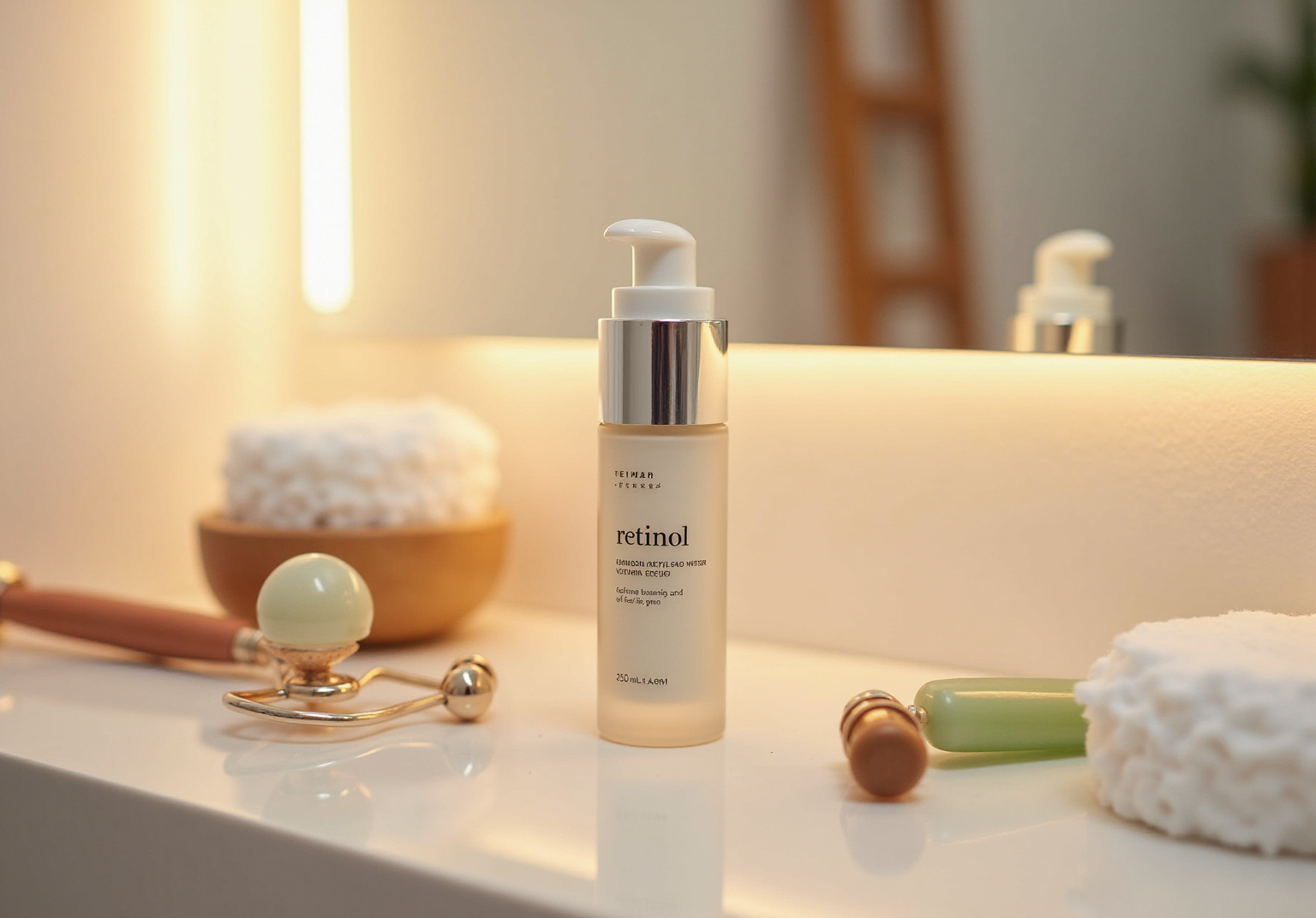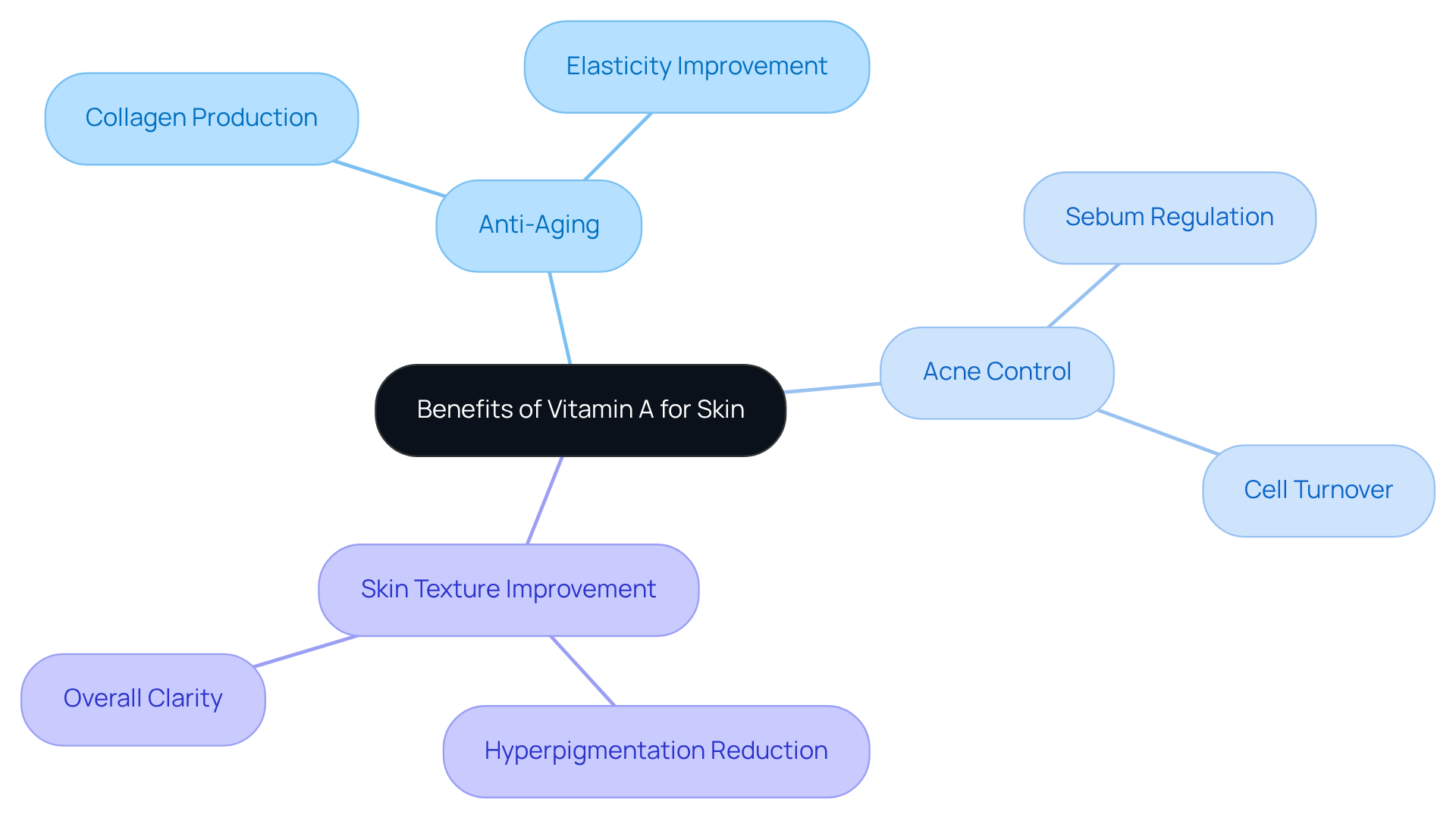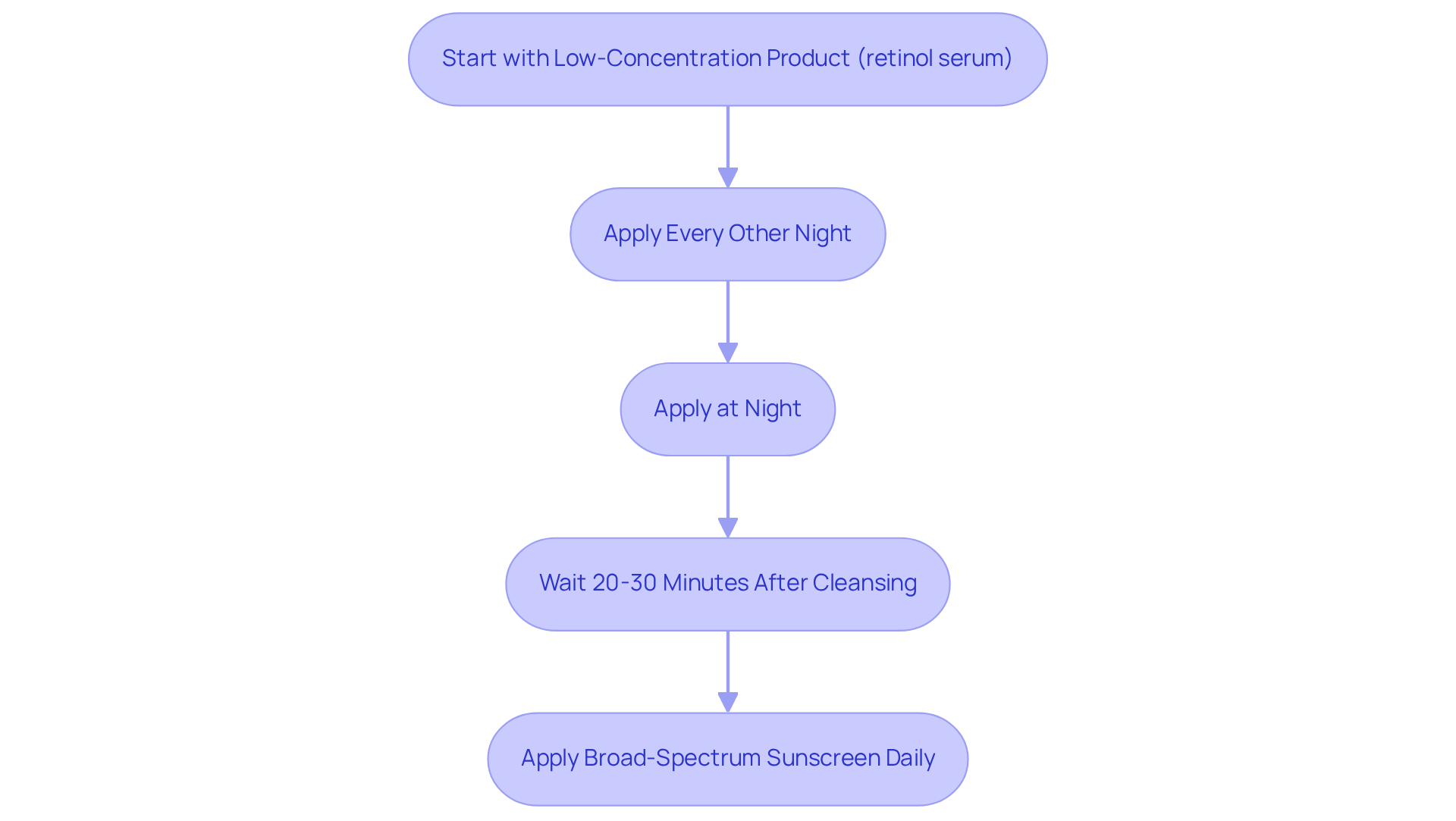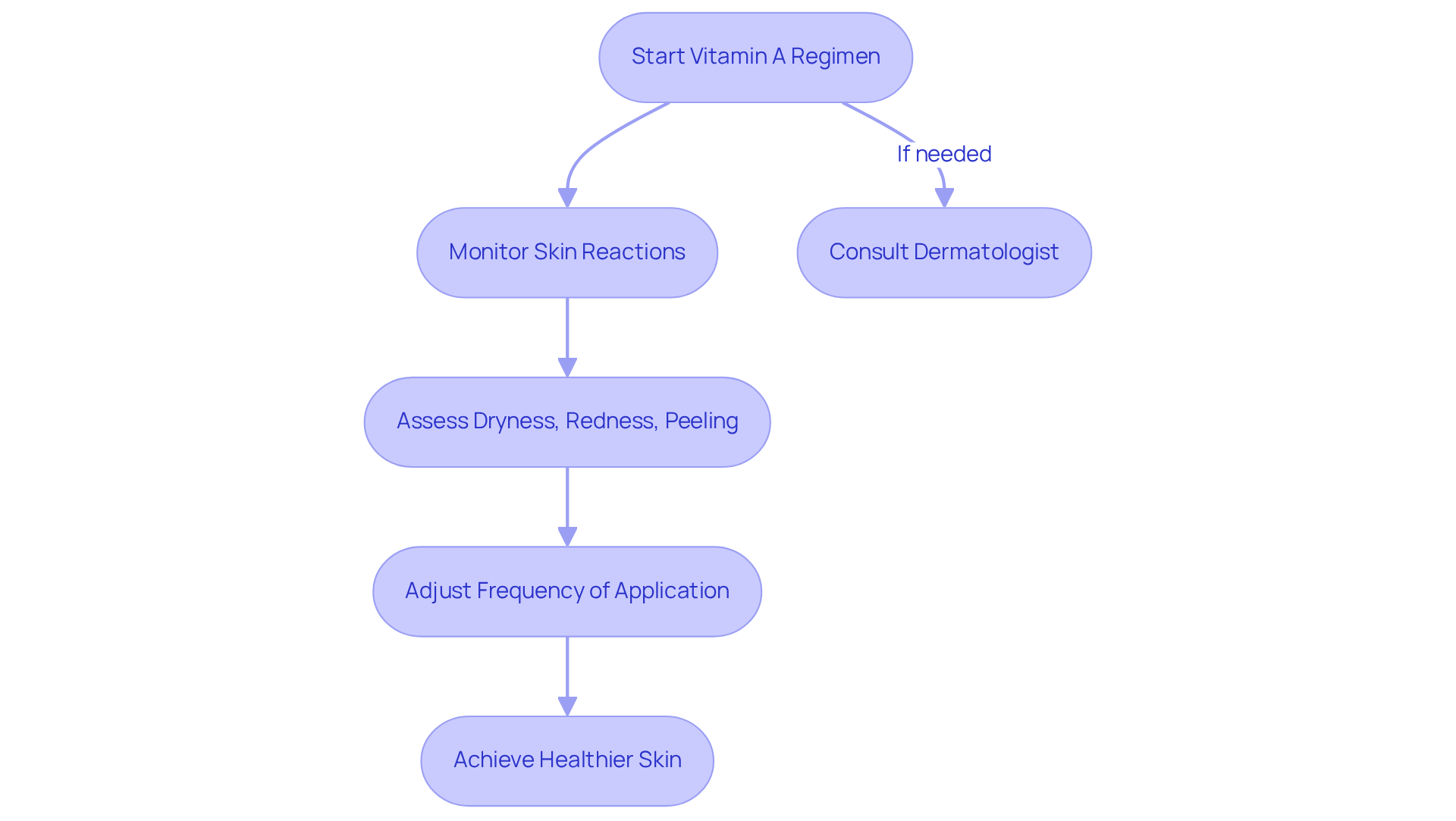Maximize Skin Health: Best Practices for Vitamin A Use

Overview
Maximizing skin health through the use of vitamin A requires adherence to best practices.
Begin with low-concentration products, apply them at night, and gradually increase usage to minimize irritation.
These strategies not only amplify the benefits of vitamin A—such as improved texture and anti-aging effects—but also facilitate safe integration into skincare routines, significantly reducing the risk of side effects.
By following these guidelines, individuals can confidently enhance their skincare regimen and achieve optimal results.
Introduction
The pursuit of radiant, youthful skin frequently drives individuals to investigate the transformative capabilities of vitamin A, a fundamental element in dermatological science. This vital nutrient, encompassing various forms such as retinol and retinoic acid, presents a multitude of advantages, including:
- Enhanced collagen production
- Acne management
- Improved skin texture
Nonetheless, the path to optimal skin health is fraught with challenges; notably, the risk of irritation and heightened sun sensitivity remains a significant concern.
How can one effectively harness the power of vitamin A while mitigating these risks? This article explores best practices for integrating vitamin A into skincare routines, empowering users to achieve their desired complexion without compromising skin health.
Understand Vitamin A: Types and Functions in Skin Health
Vitamin A for skin is a fat-soluble vitamin that exists in several forms, including retinol, retinaldehyde, and retinoic acid, all of which contribute uniquely to the health of the dermis. Retinol, a form of vitamin A for skin, is renowned for its ability to promote cell turnover and stimulate collagen production, making it a staple in anti-aging formulations. Retinaldehyde, although less potent, remains effective in improving texture and tone. Retinoic acid, the active form, directly influences cell behavior, leading to significant enhancements in various epidermal conditions.
Research underscores the importance of maintaining sufficient vitamin A for skin to preserve the integrity and function of the epidermis. It plays a crucial role in cellular repair and enhances overall appearance. Dermatologists emphasize that retinoids, such as retinol and retinoic acid, are regarded as the 'gold standard' in skincare, similar to vitamin A for skin, due to their proven effectiveness in addressing signs of aging and various dermal issues. For instance, studies have shown that retinoid therapies can significantly decrease acne lesions and improve the appearance of photoaged skin.
However, it is essential to recognize the potential risks associated with Vitamin A products, particularly increased photosensitivity, which can render the skin more susceptible to sun damage. Therefore, incorporating these Vitamin A derivatives into a skincare routine should be approached with caution. Gradually introducing retinoids can help minimize potential irritation, allowing the skin to acclimate effectively. As Dr. Deshan Sebaratnam advises, slowly incorporating a retinoid into your nighttime skincare regimen can help reduce irritation. This strategic approach not only maximizes the benefits of these potent ingredients but also ensures a healthier, more radiant complexion.

Leverage the Benefits of Vitamin A: Anti-Aging, Acne Control, and More
Vitamin A for skin is renowned for its remarkable anti-aging benefits, primarily because it enhances collagen production and improves the elasticity of the dermis. Research indicates that retinoids can significantly diminish the appearance of fine lines and wrinkles, establishing them as essential components in numerous anti-aging regimens (source: Harvard Health).
Furthermore, vitamin A for skin effectively addresses acne by regulating sebum production and promoting cell turnover, which aids in preventing clogged pores. Vitamin A for skin plays a crucial role in minimizing hyperpigmentation and improving overall skin texture.
For instance, a clinical trial revealed that participants using a Vitamin A derivative saw a substantial improvement in skin clarity and texture over a 12-week period (source: Cleveland Clinic). By leveraging these benefits, individuals can achieve healthier, more youthful-looking complexions.

Implement Best Practices: Safe Usage and Integration into Your Skincare Routine
To effectively integrate vitamin A for skin into your skincare regimen, start with a low-concentration product, such as a retinol serum, and apply it every other night. This gradual introduction allows your body to acclimate, significantly minimizing the risk of irritation.
It is imperative to apply products containing vitamin A for skin at night due to their potential to heighten sun sensitivity. After cleansing, wait 20-30 minutes before application to ensure your surface is dry, further reducing irritation.
Additionally, consistently applying a broad-spectrum sunscreen throughout the day is crucial to protect your complexion from UV damage. Regular use of vitamin A for skin, along with a well-structured skincare routine, can lead to substantial improvements in dermal health over time.
For those new to retinol, starting with user-friendly products can ease the transition and enhance overall complexion vitality.

Recognize Risks: Side Effects and Precautions When Using Vitamin A
Vitamin A for skin is renowned for its remarkable benefits for the complexion; however, incorporating it into a skincare regimen can lead to side effects, particularly during the initial phase known as the 'retinization process.' Common reactions such as dryness, redness, and peeling tend to diminish as the skin acclimates.
Dermatologists strongly advocate for a gradual approach, cautioning against the concurrent use of other potent ingredients, such as alpha hydroxy acids or vitamin C, which may intensify irritation. For individuals with sensitive skin or conditions like eczema, consulting a dermatologist before commencing a Vitamin A regimen is essential.
Real-world experiences underscore the importance of monitoring skin reactions and adjusting application frequency to significantly reduce adverse effects while allowing users to reap the transformative benefits of this powerful ingredient. By adhering to these precautions, individuals can successfully integrate vitamin A for skin into their skincare routine, thereby maximizing its potential for healthier skin.

Conclusion
Maximizing skin health through Vitamin A is a multifaceted approach that underscores the importance of understanding its various forms and functions. This essential nutrient—whether in the form of retinol, retinaldehyde, or retinoic acid—plays a crucial role in promoting skin rejuvenation, combating signs of aging, and enhancing overall complexion. By recognizing the unique benefits of each type, individuals can tailor their skincare routines to achieve optimal results.
Key insights discussed include:
- The anti-aging properties of Vitamin A
- Its effectiveness in treating acne
- The importance of safe usage practices
Gradual integration into a skincare regimen, coupled with protective measures against sun exposure, ensures that the skin can adapt while minimizing potential side effects. The emphasis on starting with lower concentrations and consulting with dermatologists highlights the necessity of a cautious approach when incorporating these powerful ingredients.
Ultimately, the significance of Vitamin A in skincare cannot be overstated. By embracing best practices for its use, individuals can unlock the transformative benefits of this essential vitamin, leading to healthier, more radiant skin. It is imperative to take the time to understand how to safely and effectively incorporate Vitamin A into daily routines, ensuring that the journey toward enhanced skin health is both rewarding and sustainable.
Frequently Asked Questions
What are the different forms of Vitamin A that benefit skin health?
The different forms of Vitamin A that benefit skin health include retinol, retinaldehyde, and retinoic acid, each contributing uniquely to the health of the dermis.
How does retinol benefit the skin?
Retinol promotes cell turnover and stimulates collagen production, making it a key ingredient in anti-aging formulations.
What is the role of retinaldehyde in skincare?
Retinaldehyde, while less potent than retinol, is effective in improving skin texture and tone.
What is retinoic acid and how does it affect the skin?
Retinoic acid is the active form of Vitamin A that directly influences cell behavior, leading to significant improvements in various epidermal conditions.
Why is maintaining sufficient Vitamin A important for skin health?
Maintaining sufficient Vitamin A is crucial for preserving the integrity and function of the epidermis, aiding in cellular repair, and enhancing overall skin appearance.
What do dermatologists say about retinoids?
Dermatologists regard retinoids, such as retinol and retinoic acid, as the 'gold standard' in skincare due to their proven effectiveness in addressing signs of aging and various dermal issues.
What benefits do retinoid therapies provide?
Retinoid therapies can significantly decrease acne lesions and improve the appearance of photoaged skin.
What are the potential risks of using Vitamin A products?
The potential risks include increased photosensitivity, making the skin more susceptible to sun damage.
How can one safely incorporate Vitamin A derivatives into their skincare routine?
It is advisable to gradually introduce retinoids into your skincare routine to minimize potential irritation, allowing the skin to acclimate effectively.
What is the recommendation for using retinoids at night?
Slowly incorporating a retinoid into your nighttime skincare regimen can help reduce irritation and maximize the benefits of these potent ingredients for a healthier complexion.


